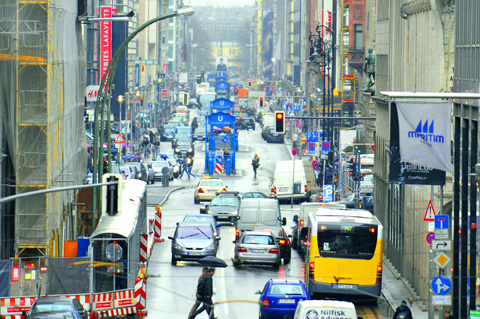It can be hard to find what remains of the Berlin Wall, a divisive landmark that for 28 years split the German capital and an entire generation.
But history buffs wanting to see the last vestiges of the iconic symbol of East versus West no longer have to consult old maps or seek out guidebooks. A new multimedia guide offers individualized walking tours connecting key points where the 166km-long wall once stood.
The hand-sized minicomputer, commissioned by the city government and to be introduced on Thursday, is linked to global positioning satellites (GPS) mapping the wall’s former path.

PHOTO: AFP
Boasting a headset and a touch-screen, it features a colorful city map that can zoom in and out, showing users where they are. The route of the former barrier between East and West Germany is marked in red while a yellow line guides the visitor from one wall section to the next, calculating the distances via GPS in meters.
“With the help of this guide, we finally have an answer to the most often asked question: ‘Where was the wall?’” Berlin Mayor Klaus Wowereit told reporters as he introduced the new gadget last week.
Most of the wall was torn down after communist East Germany collapsed and the border was opened in 1989.
A city project to mark the wall’s path is scheduled for completion by 2011, the 50th anniversary of the wall’s construction.
Apart from guiding tourists from one wall memorial to the next — among them the Brandenburg Gate, Checkpoint Charlie and the mural-covered East Side Gallery — the digital assistant gives information about 22 historically significant spots along the wall’s route.
Starting on Thursday, the wall guides can be rented at five booths throughout the city. They cost between US$9.50 and US$24 depending on how long visitors want to keep them.

SEEKING CLARITY: Washington should not adopt measures that create uncertainties for ‘existing semiconductor investments,’ TSMC said referring to its US$165 billion in the US Taiwan Semiconductor Manufacturing Co (TSMC, 台積電) told the US that any future tariffs on Taiwanese semiconductors could reduce demand for chips and derail its pledge to increase its investment in Arizona. “New import restrictions could jeopardize current US leadership in the competitive technology industry and create uncertainties for many committed semiconductor capital projects in the US, including TSMC Arizona’s significant investment plan in Phoenix,” the chipmaker wrote in a letter to the US Department of Commerce. TSMC issued the warning in response to a solicitation for comments by the department on a possible tariff on semiconductor imports by US President Donald Trump’s

The government has launched a three-pronged strategy to attract local and international talent, aiming to position Taiwan as a new global hub following Nvidia Corp’s announcement that it has chosen Taipei as the site of its Taiwan headquarters. Nvidia cofounder and CEO Jensen Huang (黃仁勳) on Monday last week announced during his keynote speech at the Computex trade show in Taipei that the Nvidia Constellation, the company’s planned Taiwan headquarters, would be located in the Beitou-Shilin Technology Park (北投士林科技園區) in Taipei. Huang’s decision to establish a base in Taiwan is “primarily due to Taiwan’s talent pool and its strength in the semiconductor

An earnings report from semiconductor giant and artificial intelligence (AI) bellwether Nvidia Corp takes center stage for Wall Street this week, as stocks hit a speed bump of worries over US federal deficits driving up Treasury yields. US equities pulled back last week after a torrid rally, as investors turned their attention to tax and spending legislation poised to swell the US government’s US$36 trillion in debt. Long-dated US Treasury yields rose amid the fiscal worries, with the 30-year yield topping 5 percent and hitting its highest level since late 2023. Stocks were dealt another blow on Friday when US President Donald

UNCERTAINTY: Investors remain worried that trade negotiations with Washington could go poorly, given Trump’s inconsistency on tariffs in his second term, experts said The consumer confidence index this month fell for a ninth consecutive month to its lowest level in 13 months, as global trade uncertainties and tariff risks cloud Taiwan’s economic outlook, a survey released yesterday by National Central University found. The biggest decline came from the timing for stock investments, which plunged 11.82 points to 26.82, underscoring bleak investor confidence, it said. “Although the TAIEX reclaimed the 21,000-point mark after the US and China agreed to bury the hatchet for 90 days, investors remain worried that the situation would turn sour later,” said Dachrahn Wu (吳大任), director of the university’s Research Center for